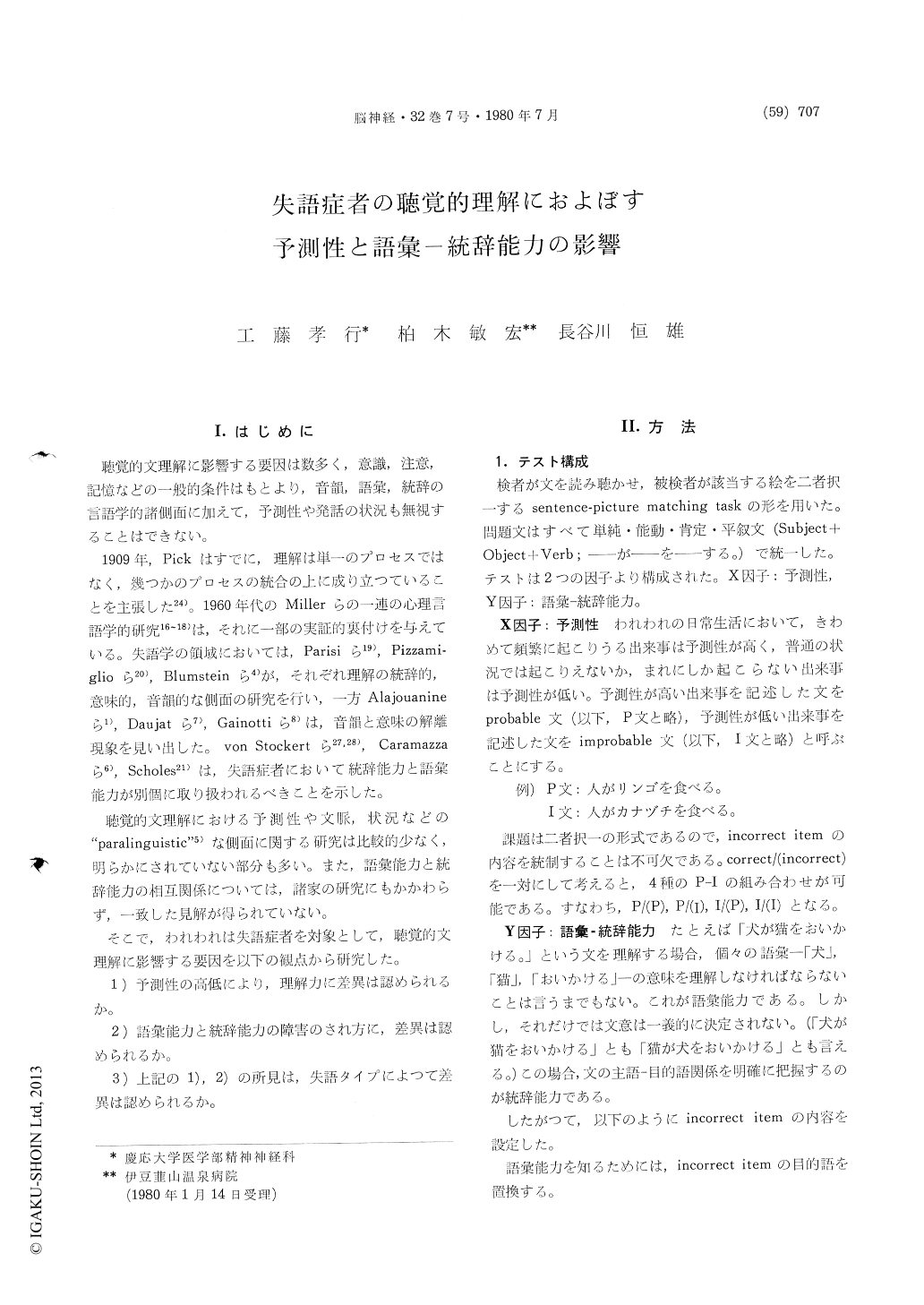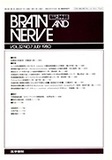Japanese
English
- 有料閲覧
- Abstract 文献概要
- 1ページ目 Look Inside
I.はじめに
聴覚的文理解に影響する要因は数多く,意識,注意,記憶などの一般的条件はもとより,音韻,語彙,統辞の言語学的諸側面に加えて,予測性や発話の状況も無視することはできない。
1909年,Pickはすでに,理解は単一のプロセスではなく,幾つかのプロセスの統合の上に成り立つていることを主張した24)。1960年代のMillerらの一連の心理言語学的研究16〜18)は,それに一部の実証的裏付けを与えている。失語学の領域においては,Parisiら19),Pizzami—glioら20),Blumsteinら4)が,それぞれ理解の統辞的,意味的,音韻的な側面の研究を行い,一方Alajouanineら1),Daujatら7),Gainottiら8)は,音韻と意味の解離現象を見い出した。von Stockertら27,28),Caramazzaら6),Scholes21)は,失語症者において統辞能力と語彙能力が別個に取り扱われるべきことを示した。
Some factors influencing auditory comprehension of aphasics were investigated.
Fifty aphasics (Broca 16, Wernicke 15, Global 10 and Amnesic 9) and 2 control groups, 13 brain damaged non-aphasics and 13 normals, were included in this study. Aphasic subjects were classified on the basis of clinical examination and their per-formance of S. L. T. A. and Token Test. Their mean age was 55.6 years, mean post-onset period 14.5 months and mean educational years 12.5. Forty-one of the subjects were males and 9 were females. Etiologies were C. V. D. (46), trauma (3), and post-encephalitic state (1). No one included in this study had disturbance of consciousness, dementia, agnosia and hearing impairment. All subjects were right-handed.
The study made use of a sentence-picture matching task. Simple active affirmative declarative sentences were used as stimuli. A plate of two line-drawings was provided for each test sentence, one of them corresponding to the sentence and the other being the distractor. The pictures differed from each other in a single detail. The examiner read aloud each sentence and the subject was required to choose the corresponding picture. A three factor with four repeated measures design was used. One between-subjects variable was aphasia type (4 levels). Two within-subject variables were expectancy (4 levels) and lexico-syntactic abilities (2 levels). a) expectancy: Two types of sentences were used,"probable sentence (P)" des-cribing common event in our daily life and "improbable sentence (I)" describing rare event. Four pairs of correct/(incorrect) combinations were considered: P/(P), P/(I), I/(P) and I/(I). b) lexico-syntactic abilities: In order to assess the lexicalability, the distractor having an incorrect depiction of the object was used. For syntactic ability the distractor showing a reversal of the subject-object relationship was used. Thirty-two test sentences were devided into four blocks of eight sentences, which were ordered randamly. Before the test each subject was screened to ensure that he under-stood the task. The stimulus sentence was presented once and a maximum of 15 sec. was allowed the subject to respond to each sentence. The scoring: one point given for each correct response, zero given for an incorrect or no response.
A 4×4×2 analysis of variance (aphasia type×expectancy × lexico-syntactic ability) with repeated measures on the latter two variables was performed on the subjects' scores. A significant effect for aphasia type was observed (p<0.01). Amnesicdemonstrated the best performance, followed by Broca, Wernicke and Global in this order. There was a significant difference across expectancy (p< 0.01) with probable sentences proving to be easier than improbable sentences. It was suggested that expected sentences were more comprehensible than unexpected ones. There was also a significant difference between lexico-syntactic abilities (p< 0.01) with lexical tasks proving to be easier than syntactic ones. There were no significant inter-actions between aphasia type and expectancy, nor between aphasia type and lexico-syntactic ability. It was suggested that the influence of expectancy and lexico-syntactic ability on subject's compre-hension did not differ in each type of aphasia.

Copyright © 1980, Igaku-Shoin Ltd. All rights reserved.


